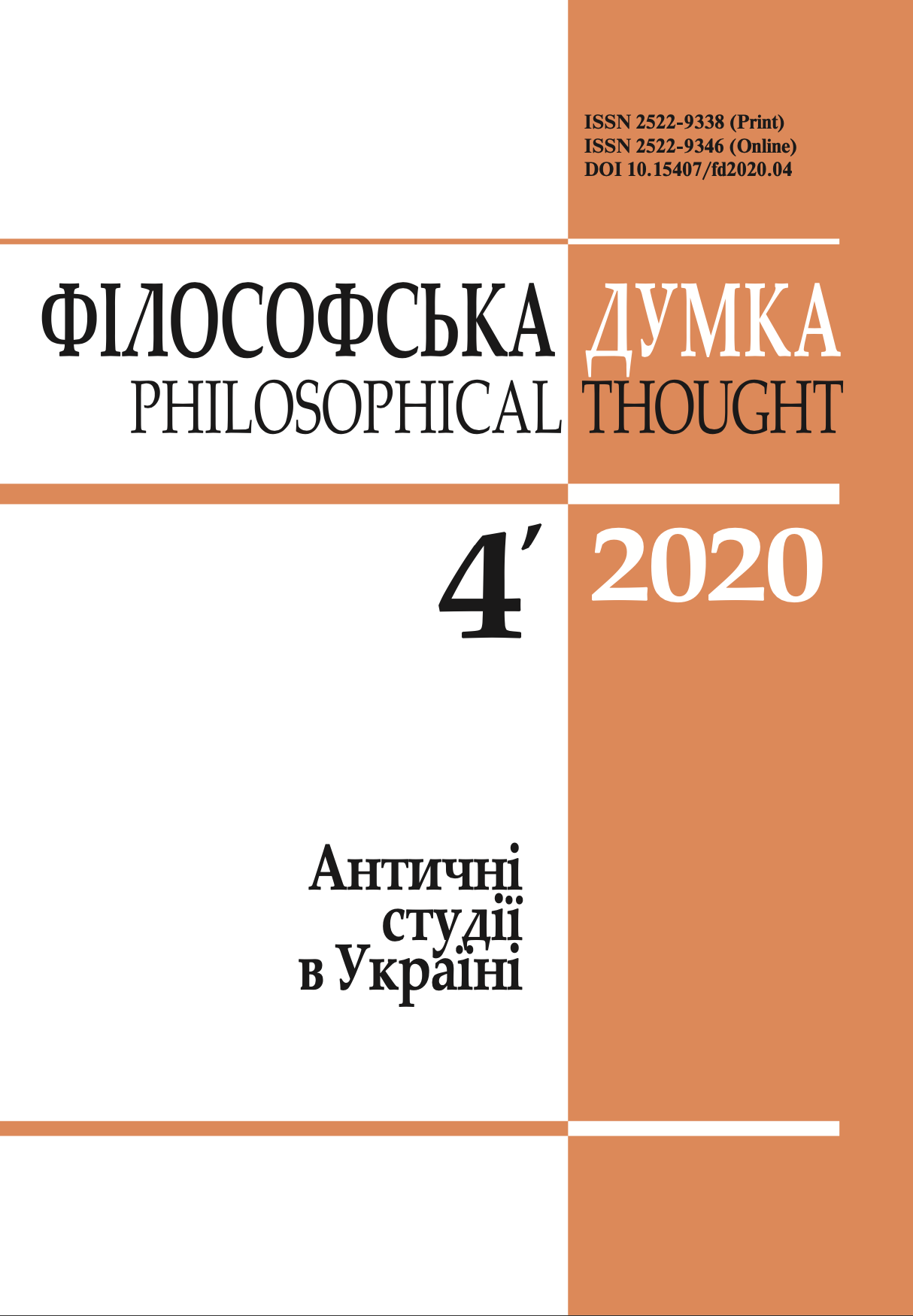Компаративний аналіз перекладів: поліваріативність форми тасмислу (на прикладі фраґментів сьомої книги Платона )
DOI:
https://doi.org/10.15407/fd2020.04.050Ключові слова:
Платон, Державний устрій, міф про печеру, просвітленість, непросвітленість, перекладАнотація
Стаття містить спробу проаналізувати, як можуть різнитися форма та смисл того само- го тексту в перекладі різними мовами і що може виявитися спільним. Уперше здійснено по- рівняння уривків давньогрецького ориґіналу сьомої книги Платона « » (Державний устрій) з їхніми перекладами японською та корейською мовами. До аналізу також залучено фраґменти литовського, латиського, латинського та англійського перекладів.
Застосовано авторський алгоритм аналізу текстів: Спочатку автор порівнює текст давньогрецькою мовою з японським і корейським перекладами. Далі залучено для порівняння фраґменти литовського, латиського, латинського та англійського перекладів. Для аналізу взято два фраґменти тексту сьомої книги, а саме репліку з нумерацією строк 514a-514b діалогу Сократа з Главконом та репліку з нумерацією 517b-517c. Саме ці фраґменти, на думку автора, демонструють найбільшу концентрацію філософських термінів, пов’язаних із міфом про печеру, який становить дослідницький інтерес. Проаналізовано в які саме форми втілю- ється термінологія цього міфу при перекладі на інші мови. Було з’ясовано, що більшість пе- рекладів зроблено не з ориґінального грецького тексту, а з інших перекладів іншими мовами. У статті представлено розгорнутий лінґвістичний аналіз і коментарі до ориґінального текс- ту та до кожного з перекладів. Представлені порівняльні таблиці термінології із проаналі- зованих фраґментів, що дає змогу наочно побачити розгалуження, викривлення чи парале- лізм семантичної форми одного і того самого тексту.
Посилання
Kassin, B., Sigov, K. (2009), European Dictionary of Philosophies. Volume one [In Ukrainian]. Kyiv: Dukh i litera. [=Кассен, Сігов 2009]
Luksti , G. (1980). Platons. Valsts. R ga: Zvaigzne.
Manuel, G. (2018). Bollettino di Studi Latini. Napoli: Periodico semestrale d’informazione biblio-
gra cafondato da Fabio Cupaiuolo. Retrieved from: https://www.academia.edu/34587998/ Machina_mundi_significato_e_fortuna_di_una_iunctura_da_Lucrezio_alla_tarda_antichit%C3%A0_in_Bollettino_di_Studi_Latini_XLVIII_1_2018_pp._10-34
Nagata, H. (1991). History of Japanese philosophical thought. [In Russian]. Moscow: Progress. [=Нагата 1991]
Plato (1713). Platonis de republica... versionem emendavit ... vol.2. Webster: Typis Academicis. Apud Tho. Retrieved from: https://books.google.com.ua/books/about/Platonis_de_republica
Plato (2013). Republic, Volume II. S.l.: Harvard University Press.
Platon (1877). Civitas Liber Septimus. Aus einer griech.-latein. Paris: Platon-Edition von Carolus
Ernestus Christophorus Schneider. Retrieved from: https://webcache.googleusercontent. com/search?q=cache:vRgatS7mRC0J:https://www.edugroup.at/fileadmin/DAM/eduhi/ data_inhalt_eduhiatdl/PLATO_Hoehlengleichnis.doc+&cd=1&hl=uk&ct=clnk&gl=ua Platonas (2000). Valstyb . VII knyga. Vilnius: Pradai.
Sobolevskii, S. (2013). Ancient Greek language. [In Russian]. St. Petersburg: Universitetskaia kniga. [=Соболевский 2013]
##submission.downloads##
-
PDF
Завантажень: 225
Опубліковано
Як цитувати
Номер
Розділ
Ліцензія
Автори, які публікуються у цьому журналі, згодні з наступними умовами:
- Автори зберігають авторське право і надають журналу право першої публікації.
- Автори можуть укладати окремі, додаткові договірні угоди з неексклюзивного поширення опублікованої журналом версії статті (наприклад, розмістити її в інститутському репозиторії або опублікувати її в книзі), з визнанням її первісної публікації в цьому журналі.
- Авторам дозволяється і рекомендується розміщувати їхню роботу в Інтернеті (наприклад, в інституційних сховищах або на їхньому сайті) до і під час процесу подачі, так як це може привести до продуктивних обмінів, а також скорішого і ширшого цитування опублікованих робіт (див. вплив відкритого доступу).


